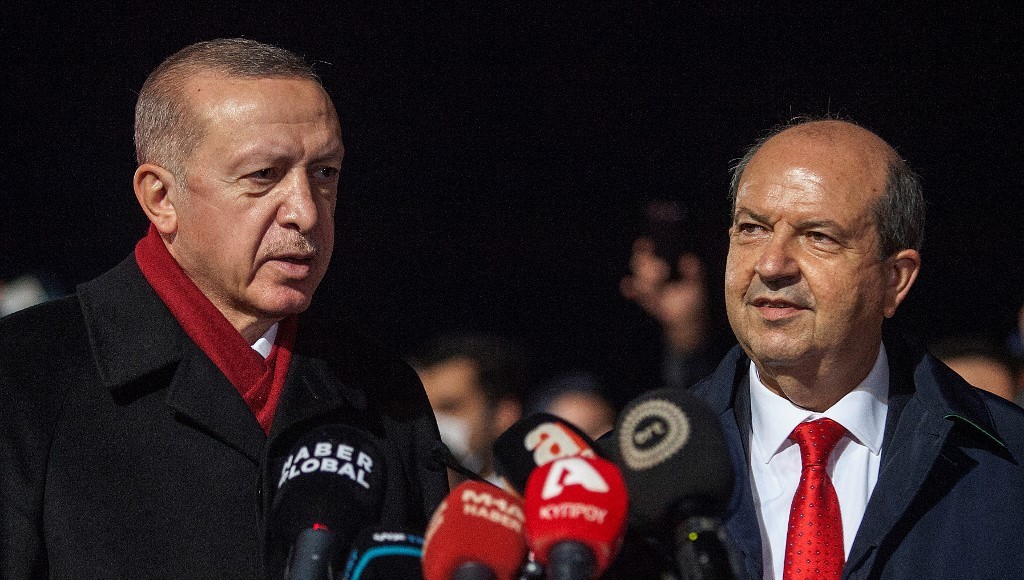Turkish President Recep Tayyip Erdoğan heads to breakaway north Cyprus Tuesday, to mark the anniversary of Turkey’s 1974 invasion, a visit infuriating Greek Cypriots with island reunification talks in limbo.
Erdoğan’s visit is seen as a show of strength to support a two-state solution to the island’s decades-long division, but also to bolster his ambitions to dominate the strategic eastern Mediterranean.
In a gesture set to send tensions soaring, Erdoğan will review some of the thousands of Turkish troops in the self-declared Turkish Republic of Northern Cyprus (KKTC) in the abandoned beach resort of Varosha, which the invasion emptied of its Greek-Cypriot inhabitants.
“It is not only a symbolic visit… but one that will affect the Cyprus problem,” said Giannis Ioannou, of the Geopolitical Cyprus think tank.
Tensions are already running high, fueled by an influx of undocumented migrants into in the south that the government there sees as a pressure tactic by Ankara.
On Friday, Cyprus government spokesman Marios Pelekanos condemned Turkey’s “aggressive behavior” after Cypriot police said the Turkish coastguard fired warning shots at one of its vessels off the island’s north coast, a report denied by Ankara.
‘Red line’
The Turkish invasion — launched in response to an Athens-engineered coup in Nicosia designed to unite Cyprus with Greece — was followed in 1983 by the proclamation of the KKTC, still recognized only by Ankara.
Varosha — once the playground of celebrities and dubbed a “Jewel of the Mediterranean” — was left a fenced off ghost town, where former luxury hotels have become overgrown by weeds.
The Turkish army restored public access to parts of the beachfront last year and Erdoğan is expected to extend that during his visit.
“He will announce the opening of new parts of the city. His message is clear: he wants to change the paradigm for the future negotiations,” Ioannou said.
“Varosha is a red line not to cross for the Cypriot government,” he added.
The majority Greek-speaking Republic of Cyprus, a European Union member with effective control over the southern two-thirds of the island, condemned Erdoğan’s last visit in November 2020 as a “provocation without precedent.”
UN-backed talks on reunifying the island as a bicommunal federation collapsed in 2017 and efforts to revive them have hit a new, tougher line from Ankara demanding a two-state solution.
In April, a UN summit in Geneva failed to broker a deal to start a new round of talks.
“Erdoğan… believes Greek Cypriots do not want the peace, but to keep the status quo,” Ioannou said, accusing the Turkish president of exploiting Varosha as a “card” for “retaliation”.
When Erdoğan last visited Varosha in November, he said “compensation would be paid” to Greek Cypriots who lost properties in the resort.
‘Harsh bargaining’
But Ahmet Sozen, a Turkish Cypriot at the head of the Cyprus Policy Center at the Eastern Mediterranean University, argues Erdoğan has only made this proposal so as to blame “bad will” for its refusal.
“Turkey wants to start the future negotiation cycle with a higher position, and to impose the two states solution,” Sozen said. “It is a harsh bargaining period.”
Proponents of the two-state solution argue that it would allow the economy of northern Cyprus to diversify, and be viable without the constant backing of Ankara.
Earlier this month, however, European Commission President Ursula von der Leyen said Brussels would “never, ever accept a two-state solution.”
Erdoğan “knows well this solution won’t fly, no country will support it,” Sozen said.
But for Kemal Baykallı, a Turkish Cypriot analyst and an activist for Unite Cyprus Now, the island of some one million people is no match for the power of near neighbor Turkey, which lies just 70 kilometers (44 miles) to the north.
“What the EU forgets is that Cyprus is too small to be divided,” Baykallı said.
“If you let Turkey have the upper hand too long, it will end up dominating this European island.”
Erdoğan’s visit is also being scrutinized for what it could say about Turkish regional ambitions and the search for oil and gas in disputed eastern Mediterranean waters.
“Turkey is fighting against the new block formed around Cyprus on the gas issue,” Sozen said.
“Turkey feels isolated and is ready to use any means to pressurize Cyprus, and it can use Varosha.”
Israel, Greece and Cyprus last year signed the EastMed deal for a huge pipeline to ship gas from the eastern Mediterranean to Europe, triggering objections from Ankara.
“It’s a poker game,” said Baykallı, adding that there is “no doubt that Cypriots — especially people from Varosha — will be the big losers.”
AFP

